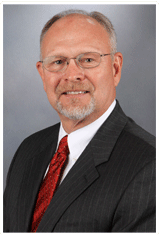The third week of session brought a flurry of activity to the Capitol. The governor presented his proposed budget for Fiscal Year 2016 during the annual State of the State address to the General Assembly on Wednesday evening in the House chamber. On Thursday, the Legislature was again addressed when Chief Justice Mary R. Russell of the Missouri Supreme Court gave the State of the Judiciary. Also this week, several of the Senate committees met to consider their first assigned bills of the session.
One of those was Senate Bill 5, which was heard in the Jobs, Economic Development and Local Government Committee on Wednesday. “Macks Creek Law,” as it is commonly called, prohibits a municipality from receiving more than 30 percent of its annual revenue from traffic fines and court costs for traffic violations. All revenues in excess of the 30 percent threshold must be sent to the Department of Revenue to be distributed annually to county schools. SB 5 reduces the threshold to 10 percent.
My colleagues and I are prepared to discuss whether the threshold should be changed. However, I was disappointed to see during the committee that the discussion dissolved into a conversation about the recent events in Ferguson, instead of the merits of the bill.
On Thursday, the Seniors, Families and Children committee heard testimony on legislation modifying certain provisions of the Temporary Assistance for Needy Families (TANF) program and the Supplemental Nutrition Assistance Program (SNAP). Under current Missouri law, we allow people two years of TANF benefits before having to show any type of work activity. Senate Bill 24 amends the law so that individuals will first have to show work activity or school enrollment before being eligible for benefits. Additionally, SB 24 would shift any savings to programs such as childcare that make it easier for families to work.
Senate Bill 24 aims to provide the assistance people need during difficult times, while also promoting personal responsibility through the work requirement. In 2011, only 14.1 percent of our state’s TANF recipients were working. Missouri’s program is clearly failing. This was meant only to serve as temporary assistance, not a long term entitlement. Not all that long ago, people followed the jobs. We were mobile and much more willing to go wherever the work was, not just sit passively by and wait for opportunity to fall in our laps.
MoDOT NEWS
We use them every day. They make it possible for us to get to work, for families to take vacations, and for businesses and agriculture to ship their products across the state and the country. They are the 34,000 miles of roads that make up the largest part of Missouri’s transportation system. A system that will very soon be facing a huge funding shortfall.
In 2009, Missouri Department of Transportation’s (MoDOT) construction budget was $1.3 billion. It dropped to $700 million in 2014. In 2017, it will drop even further to $325 million. To help prepare, MoDOT proposed their plan for doing as much as they can with diminishing funds.
MoDOT classifies Missouri’s roads into two categories: primary and supplementary. Primary roads (approximately 8,000 miles) are roads that connect cities across the state. Supplementary roads are made up of the approximately 26,000 remaining miles used for local travel. Under the proposal, MoDOT will focus on maintaining the state’s primary roads and bridges, while only being able to do limited routine maintenance on supplementary roads and bridges.
When it comes to something as vital as our state’s transportation infrastructure, it’s important to be proactive. Because of previous initiatives, the majority of our roads and bridges are currently in good condition; however, maintaining that same condition will not be possible unless there is a new funding source. Missouri ranks at 46th in the amount of revenue we spend per mile, even though we have the 7th largest highway system in the country.
To remedy the situation, some of the options on the table include toll roads and increasing the fuel tax rate—although avoiding either of these options is preferable. While the situation is serious, we will continue looking for new, innovative ways to fund the maintenance of our roads and bridges. For more information on MoDOT’s proposals please visit www.modot.mo.gov.
Contact Me
I always appreciate hearing your comments, opinions, and concerns. Please feel free to contact me in Jefferson City at (573) 751-4008. You may write me at Gary Romine, Missouri Senate, State Capitol, Jefferson City, MO 65101; or email me at gary.romine@senate.mo.gov; or www.senate.mo.gov/romine. |



